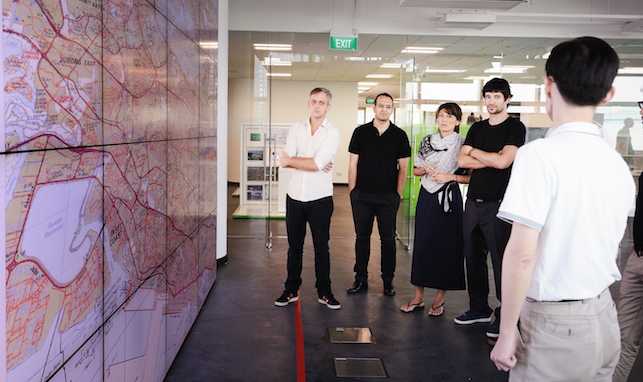Collaboration Platforms

Research at the Future Cities Laboratory is supported by a set of important collaboration platforms:
1. Collaborative Interactive Visualisation + Analysis Laboratory (CIVAL)
The Collaborative Interactive Visualisation and Analysis Laboratory (CIVAL) facility supports research at the Future Cities Laboratory through the development of cutting-edge visualisation and interaction techniques to facilitate the usage of ICT-based research infrastructure. It works closely with projects that have specific visualisation and interaction requirements or whose research output can be directed towards further dissemination through prototype development. In addition, CIVAL will help identify visualisation and interaction related synergies between projects, and thereby contribute to streamlining common efforts.
2. The CAVE
The CAVE is an immersive virtual reality system that provides real-time interaction with 3D environments. This system can be used by designers for visualising indoor and outdoor environments before construction to avoid potential missteps. For example, the CAVE facility allows researchers to anticipate the usability of different building designs with respect to the eventual patrons. This system consists of three projection walls, control interfaces for interacting with the virtual worlds, and various behavioural and physiological measurement devices.
3. Materials Laboratories
The Materials Laboratories comprising the Advanced Fibre Composite Laboratory, the Alternative Sand Laboratory and the Shared Workshop, support the development of alternative construction materials. The Advanced Fibre Composite Laboratory supports research on innovative organic fibres. The Alternative Sand Laboratory supports research on reclaimed materials from otherwise wasted building rubble. Finally, the Shared Workshop is a collaborative production space equipped with CNC-router, laser cutters and wood-processing machines.
4. Spin-off Track
Many innovative ideas and technologies that emerged from the first phase of the Future Cities Laboratory showed commercial potential. A Spin-Off track was developed to bring these ideas and technologies to reality. Several of the research teams working in this area were supported by competitive proof-of-concept grants and/or industry funding. A number of resulting projects – such as the Advanced Fibre Composite project, and the Robotic Tiling project – are now well on their way to producing innovative marketable products.
5. Value Lab Asia
The Value Lab Asia and its companion space in ETH Zurich, is a central infrastructure for research, education and communication at the Future Cities Laboratory. It is a collaborative, digitally augmented environment that serves a wide range of applications, such as participatory urban planning and design, stakeholder communication, information visualisation and discovery, remote teaching and conferencing. It includes a 33-megapixel video wall, three large displays with touch overlays, a number of smaller, mobile multi-touch enabled displays, and extensive video conferencing capabilities.